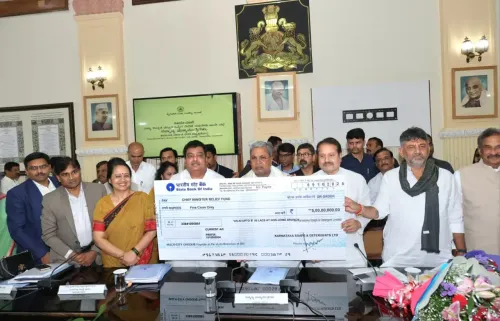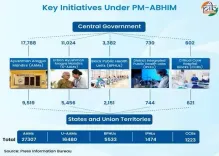How Will GST Reforms Enhance Karnataka's Economy?

Synopsis
Key Takeaways
- Lower costs for farmers and artisans
- Increased market access for MSMEs and exporters
- Enhanced competitiveness in the drone industry
- Support for women workers in processing sectors
- Price reductions across various agricultural products
New Delhi, Oct 24 (NationPress) The recent GST reforms are set to provide substantial advantages to farmers in Karnataka who cultivate coffee, dairy, and cashew, as well as artisans involved in handloom and handicraft production, and entrepreneurs steering industrial and technological advancements, as announced by the government on Friday.
These tax cuts will help lower expenses, broaden market reach, and enhance profit margins for farmers and artisans, thereby bolstering the competitiveness of MSMEs and exporters, according to an official statement.
Changes in the tax structure will lead to price reductions on items such as coffee extracts, instant coffee, UHT milk, paneer, ghee, butter, processed cashew nuts, coir goods, and processed fish, with retail prices expected to drop by 5–12 percent depending on the product.
Karnataka accounts for around 71 percent of India’s coffee output, particularly from regions like Kodagu, Chikkamagaluru, and Hassan. The reforms could lower retail prices by 11–12 percent, significantly benefiting small processors and cooperatives.
The elimination of GST on UHT milk and paneer, along with a reduction from 12 percent to 5 percent on ghee and butter, is projected to cut retail prices by 5–7 percent. This will not only enhance cooperative margins but also support the livelihoods of around 26 lakh milk producers linked to the Karnataka Milk Federation, the statement highlighted.
In coastal regions like Dakshina Kannada and Udupi, processed cashew nut prices will decrease from 12 percent to 5 percent, leading to a price decline of 6–7 percent, which will benefit numerous women workers.
Furthermore, the reduction of GST from 12 percent to 5 percent on coir mats, rugs, and geotextiles is expected to lower their prices by 6–7 percent, enhancing their competitiveness against synthetic options, the statement mentioned.
Prices for canned tuna, frozen shrimp, and ready-to-eat fish curries are anticipated to be 6–7 percent lower due to the GST reforms, increasing value addition within the fisheries sector.
The rate cut on agricultural machinery will substantially lower the costs associated with farm mechanization. The GST rejig is also expected to strengthen Karnataka’s export-oriented garment clusters, boost employment for women, and stimulate demand throughout the textile value chain, from spinning to apparel production.
Other sectors likely to benefit from the GST reforms include Mysore Rosewood inlay art, Bidriware—one of India's premier metal handicrafts, Ilkal and Udupi handloom sarees, the granite industry, cement, and drones.
The reforms are expected to reduce prices for domestically manufactured drones by 11–20 percent, thereby solidifying Karnataka’s status as a hub for drone innovation and enhancing competitiveness against imports.









